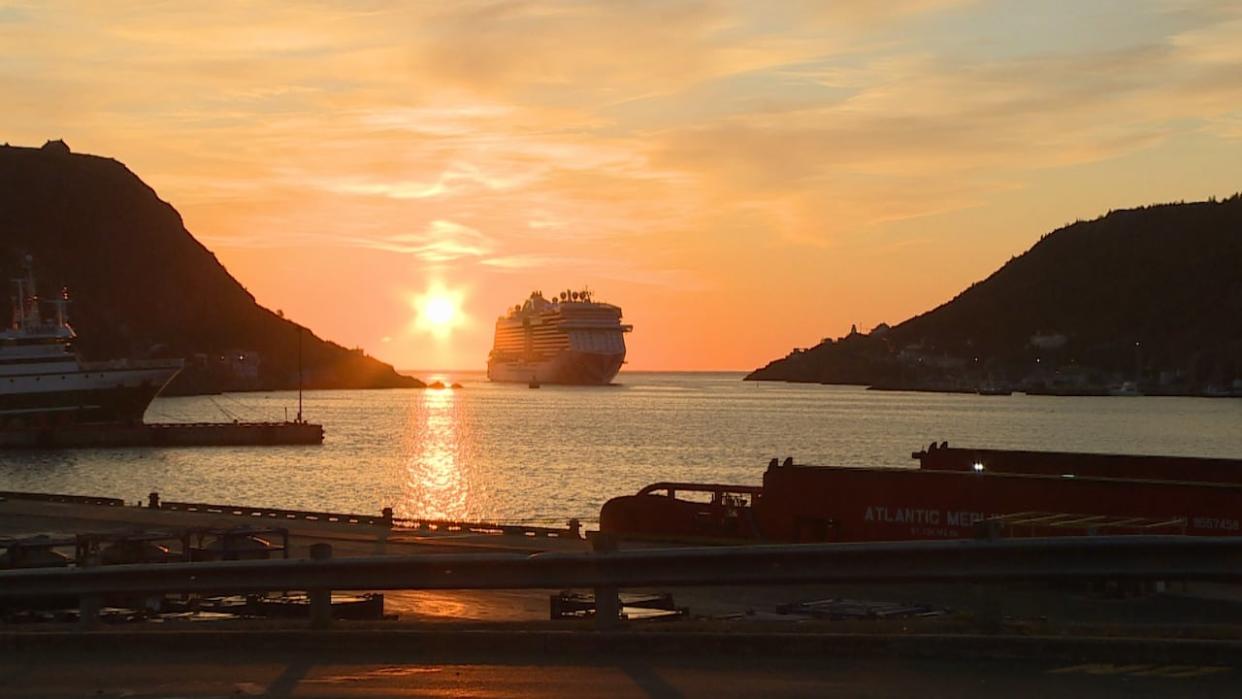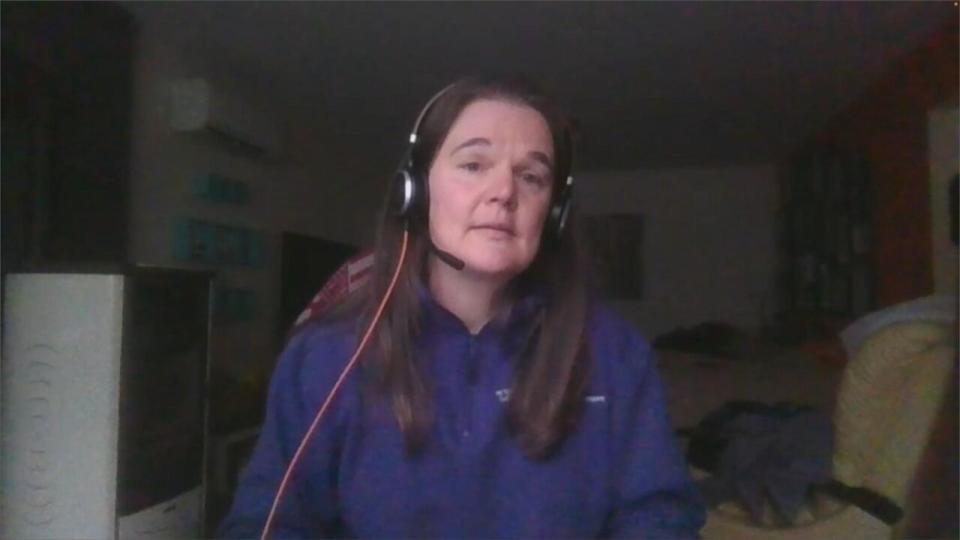Broken PFD, minimum staffing led to death of pilot boat deckhand in 2022: TSB report

An investigation by the Transportation Safety Board has determined the death of a pilot boat deckhand near St. John's was caused by a confluence of factors including a damaged flotation device, a flawed tether system and a minimum staffing level that left one person responsible for driving the boat and rescuing him from the water.
Terry Roberts, 61, died after falling overboard on Sept. 27, 2022. He was 3½ kilometres outside the narrows when the incident happened.
The investigation report determined his personal flotation device did not automatically inflate when he hit the water, and he wouldn't have been able to inflate it manually since a critical piece of the device was broken.
"I would describe it as hazards known that could have been mitigated," said TSB senior investigator Karie Allen.
"A really, unfortunately preventable set of circumstances."
Roberts was on the final shift of a seven-day rotation. He and his wife, Christa, had a trailer packed and ferry tickets booked to move out of the province and start new.
The investigation pointed out that the manufacturer of the PFD had recommended they be serviced twice per year, while the company had done it only annually. It also found the company used a checklist that did not incorporate all of the manufacturer's advice.
"This is what led to it not being functional on the day," Allen said. "It's a known issue. Inflatable PFDs are actually really complex, and they don't actually provide any buoyancy whatsoever if they don't inflate."
The incident led to the TSB issuing a safety bulletin in 2023, calling on owners to maintain inflatable PFDs according to the manufacturer's instructions.

Terry Roberts, left, died in a workplace incident on Sept. 27, 2020. His father-in-law, John Connors, middle, and brother-in-law, Craig Connors, right, say he was a good man and a great husband. (Submitted by John Connors)
Man fell while briefly untethered
The pilot boat was owned by the Atlantic Pilotage Authority (APA), but operations were contracted to Canship Ugland.
That evening started like many others, as they headed outside the narrows and into the open ocean to meet an incoming vessel. Roberts, the deckhand, was joined by the ship's master and a pilot.
The waves were between 1½ and 2½ metres, and the water was a chilly 14 C.
The pilot made a seamless transfer onto the vessel, and they began to head back toward St. John's with two men left on board the pilot boat.
As the deckhand, Roberts was required to be tethered while outside the boat's wheelhouse. The investigation found that wasn't possible at all times, as deckhands would have to be untethered to go up and down the stairs to the wheelhouse, and when they were going from the side of the wheelhouse to the front.
It's believed Roberts fell overboard in the few seconds he was untethered.
The master heard yelling from the other ship and discovered Roberts had fallen into the water. As the master went on deck to toss him a life-preserver, the boat drifted from its position and he lost sight of Roberts in the water.
About 20 minutes later, Roberts was recovered by the other vessel. It was too late.
Staffing levels called into question
Minimum staffing levels for pilot boats are determined by Transport Canada.
The process for determining those staffing levels looks at hypothetical situations like fires, or abandoning the boat. At the time of the incident, there was no requirement to consider persons-overboard scenarios when setting the minimum staffing levels.
As a result, the APA has a minimum staffing level of two people. That meant the master was all alone when trying to both manoeuvre the vessel and use a device to retrieve Roberts from the water.
"You just can't do it," Allen said. "It's practically impossible."

Karie Allen is a senior investigator with the Transportation Safety Board. She was the lead investigator on the incident that claimed the life of 61-year-old Terry Roberts in 2022. (CBC)
The investigation also revealed the crew had flagged this as an issue in the APA's last inspection. They felt it was difficult to operate both the boat and the person-overboard device with two people — let alone one.
Despite it being flagged by the APA, the information was not acted on, "in part because this safety-related information was not received by Canship," the report says.
A Transport Canada inspector would later file a challenge of the minimum staffing level for the sister vessel of another pilot boat in St. John's. It was dismissed, as the person-overboard scenario was not a mandatory consideration.
In late 2022, Transport Canada updated its regulations to require companies to submit plans for a person overboard.
"These details are now part of the minimum safe manning evaluation for all vessels," the report reads.
Internally, the APA changed its procedures in the days following Roberts's death to add another person to each boat.
Gaps in safety training
Aside from the minimum staffing levels, the investigation found other issues with safety procedures between the APA and Canship Ugland.
While Canship had its own set of rules, many of them were more applicable to larger ships and had nothing to do with pilot boats. The APA had its own safety measures and discovered problems through its own inspections, but they weren't always communicated to Canship.
The person-overboard drills were also flagged as an issue, since they were conducted in the harbour and not out on the ocean.
"Person-overboard drills as practised did not reflect typical conditions, and the hazards associated with low crewing levels were not formally reported through Canship's [safety management system] for action and followup," the report reads.
The TSB also found the vessel had not undergone a maritime occupational health and safety inspection by Transport Canada in the five years before the incident.
Fatigue also flagged
Roberts had been on call for seven days straight.
Pilot boats must have a minimum of four hours' notice for an inbound vessel, leading to odd sleep schedules for the crews who work on them.
The investigation found Roberts had been awake for 18 hours straight at the time he fell overboard.
"The deckhand was subject to multiple fatigue risk factors such as acute sleep disruption, chronic sleep disruption, continuous wakefulness, circadian rhythm effects, and likely was fatigued at the time of the occurrence," the report says.
"Without effective fatigue risk management, crews working irregular and unpredictable work schedules, with long hours, may be at increased risk of performance impairments due to fatigue."
In response to the incident, the TSB says the APA also did the following:
Added more grip to the stairs outside the wheelhouse.
Set person-overboard retrieval devices before leaving the harbour.
Use buoyant PFDs in more situations, as opposed to inflatable PFDs.
Field testing PFDs with wind and waves.
Incorporate more person-overboard drills.
Download our free CBC News app to sign up for push alerts for CBC Newfoundland and Labrador. Click here to visit our landing page.

